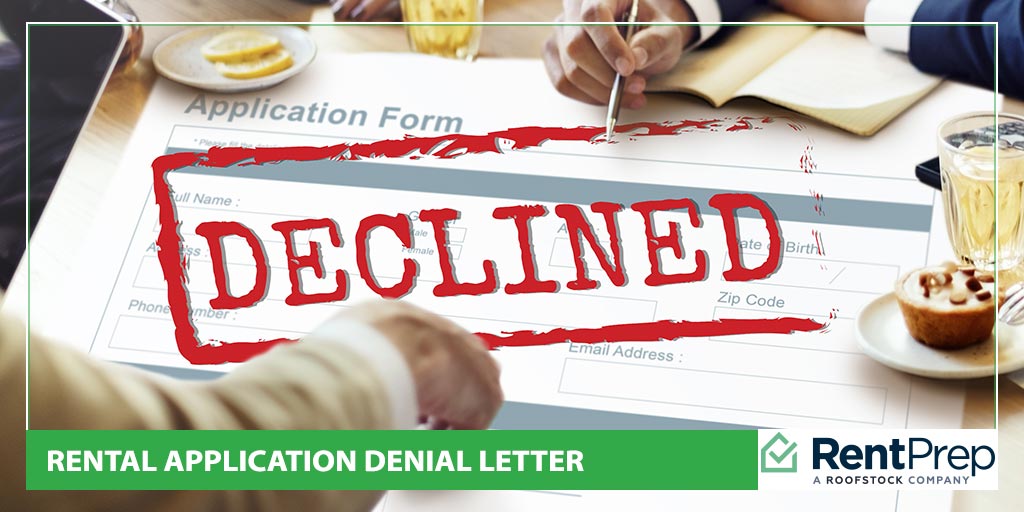
As a landlord, you need to know how to deny an applicant based on the information found in their tenant screening report. A rental application denial letter (also referred to as an adverse action letter) will need to be issued to the denied renter.
We will provide you with a rental rejection letter but first, we need to cover a few important pieces of information.
Regardless of the reason, whether it’s a judgment or an eviction, the action of denying the tenancy is considered an adverse action.
According to the FCRA, this action requires a process of communication that must be followed. As a landlord, it is your responsibility to know the appropriate procedure for sending a denied rental application letter. Today, we’ll teach you how to do just that with our in-depth samples.
A Table of Contents for Rental Rejection Letter
- When is an Adverse Action Notice Required?
- A Step-by-Step Guide to Issuing a Rental Application Denial Letter
- Tenant Rejection Letter Template: Our 3 Forms for Landlords
- Are Landlords Required to Give a Copy of the Background Check to the Tenant?
- Helpful Resources
When is an Adverse Action Notice Required?

An adverse action notice is required when a landlord denies an applicant based on the tenant screening report. This includes the denial of tenancy, as well as the approval with additional terms such as an additional deposit or anything imposed outside of the landlord’s standard rental terms due to “higher risk”.
A Step-by-Step Guide to Issuing a Rental Application Denial Letter
Step 1 – Determine if the type of adverse action will be:
- Approving tenancy with conditions such as an extra security deposit or additional lease terms
- Or denying the tenancy
Step 2 – Prepare the Proper Adverse Action Letter
Once you determine your choice, you need to prepare an adverse action notice.
You can search the internet for an adverse action template or you can use one of our generic forms below. If you’re a RentPrep client, you can download these forms with our information included in your member’s portal.
We’ve added mentions of “tenant screening company” or “CRA” (Consumer Reporting Agency, which is what RentPrep is) to the documents. You’ll need to enter your background check company’s information in those spots.
- Adverse Action Notice (Consumer Report Denial)
- Adverse Action Notice (Specific Denial)
- Adverse Action Notice (Screening Agency Involved)
In the section following this step-by-step guide, we will go over each of our forms, when to use them, and what important differences you should note between them. In the end, all three will be useful to you.
Step 3 – Mail the Adverse Action Notice to your Applicant
Be sure to mail the adverse action notice to your applicant, along with “A Summary of Your Rights Under the Fair Credit Reporting Act”.
Tenant Rejection Letter Template: Our 3 Forms for Landlords
When you send a polite letter to decline tenant applications, you have a bit of variation in what you can send. Not every situation will fit every letter type, so we have put together three different ones. Choose one sample rejection letter for rental application denials from our types below.
Adverse Action Notice (Consumer Report Denial)
The first letter that we are sharing today is a general denial letter. The point of this letter, like the other adverse action notice samples, is to let an applicant know that their application will not be accepted.
Rather than specifically stating a reason, this form tells the tenant nothing more than the fact that their application is being denied due, in part, to information gathered through a consumer report agency.
Check out our sample to get an idea of what this form conveys to the applicant:
| Adverse Action Notice (Consumer Report Denial) |
What’s In This Notice
There are a few main pieces of information that you must include when sending out this type of adverse action notice.
First, you must list your contact information followed by the applicant’s name and contact information. Then, you need to let the applicant know that their application is being denied.
Once you complete that opening, it is time to give them more specific information about why they are being denied. In this letter, the applicant is being denied due to the information gathered from a consumer reporting agency. As such, you should include the following:
- Which reporting agency provided a report
- The reporting agency’s address and contact information
- The release of liability from the reporting agency in regards to your decision
All of this information must be given to the applicant so that they can clearly understand what type of information was reported about them and where it came from. With the contact information that you provide, the tenant can follow up on any confusing reports on their own.
Finally, it is your duty as a landlord to let the applicant know that they can receive a copy of the same report that you received as long as they contact the reporting agency within 60 days.
It is important to tell the applicant this information so that they can see exactly what you saw in the report. Because the information is about them, they have a right to see the same report in order to ensure its accuracy.
Adverse Action Notice (Specific Denial)
The next type of adverse action notice that we will talk about today is a specific denial letter. Unlike the consumer agency reference letter that we explained above, this letter gives the tenant a specific denial reason(s) from a list of various possibilities.
Let’s take a closer look at this type of rejection letter:
| Adverse Action Notice (Specific Denial) |
Find out how to properly write a rejection letter to your rental applicants:
What’s In This Notice
This notice gives the applicant specific information about why their application is not going to be accepted at this time. Let’s walk through what you should include.
First, you need to include the same basic information that all adverse action notices need to include:
- Landlord name and contact info
- Applicant name and contact info
- Statement of denial
After you give this basic introduction information, insert a checklist of potential reasons for denial. Depending on where your property is located, the checklist may include the following:
- Temporary or irregular employment
- Unable to verify employment
- Unable to verify income
- Length of residence
- No credit file
- Delinquent past or present credit obligations
- Delinquent past or present rental obligations
- Bankruptcy
- Criminal record
- Eviction filing or judgment
- Garnish, foreclose, or other related judgment
- Other (must include reason)
You can check off one or more of these items to let the applicant know why they are being denied. Remember, however, that you should modify this list to apply to your specific location. In some areas, it may not be legal to deny an applicant for their criminal record, for example, so you want to be sure to check your local rules before sending out this notice.
Finally, you need to wrap up the information that you are sending to the tenant with some basic information about the agency which gave you the information about the private parts of their record. Include all of the following:
- Agency name and contact information
- Agency liability disclosure
- How long the applicant has to request a copy of any reports run on them
It is important to include this information as the applicant has a legal right to see, check, and dispute any information that an agency has reported about them. While this dispute would not involve you, you are legally obligated to inform the applicant about where you gathered information on them from.
Adverse Action Notice (Screening Agency Involved)

The final type of adverse action notice that we are sharing today is a general denial notice that allows the applicant to know what type of screening agency was involved in reporting information about them.
If, for example, you deny an applicant after using our services, you would include our contact information in this letter so that the applicant can contact us for further information about the reports that we ran for you.
Let’s take a look at the form for this type of notice:
| Adverse Action Notice (Screening Company) |
As you can see, this form is very similar to the previous two forms that we talked about. You must include all of the same basic information such as contact information for all involved parties and the statement of denial, but there is one difference.
Rather than including the contact information for a consumer reporting agency, the name and contact information of the screening company should be included. Since you did not run the credit report yourself, you do not need to give the consumer reporting agency’s information.
To conclude, it is still your responsibility to let the applicant know that they can receive a copy of any reports run about them as long as they reach out to the company within 60 days. In this case, you would advise them to reach out to the screening company in order to begin that procedure.
For more information on how to phrase a rental application denial letter and more, check out this video:
Are Landlords Required to Give a Copy of the Background Check to the Tenant?
Landlords are not required to give the tenant a copy of the background check. That responsibility falls on the consumer reporting agency.
Once the adverse action notice is given, the tenant or applicant can communicate directly with the tenant screening company as advised in the letter with the contact information provided.
The tenant screening company can then provide a Consumer Copy once the tenant or applicant verifies their identity by sending a photocopy of their driver’s license or other form of ID.
Helpful Resources
You may not have run your tenant background report through RentPrep but we try to be as helpful as possible regardless.
If you’re in the denial stages of your screening process, we would recommend checking out our tutorial on how to properly set up a new tenant.
You want to make sure this step goes as smoothly as possible.

